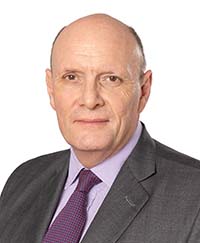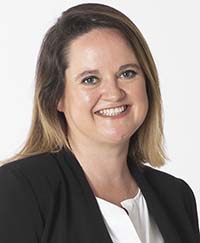Ireland’s investor services sector is undergoing a real-life stress test. Funds Europe speaks to some of its foremost personalities about working from home and the business-as-usual matters of asset servicing.
 ETAIN DE VALERA, PARTNER, ASSET MANAGEMENT AND INVESTMENT FUNDS, DILLON EUSTACE
ETAIN DE VALERA, PARTNER, ASSET MANAGEMENT AND INVESTMENT FUNDS, DILLON EUSTACEWhat, apart from work, are you finding time to do during lockdown?
The silver lining of lockdown is definitely more family time. In particular, rediscovering those board games that have been gathering dust in the back of the cupboard has helped develop those competitive streaks – and that’s just the parents! We have even managed to rope in family from around the world through Zoom and Kahoot! for a now regular Sunday quiz night.
In the Central Bank’s Financial Stability Review 2019, there is a good deal of emphasis put on risk arising from non-bank lending. Do you see any implications here, from a regulatory standpoint, for investment funds investing in these areas?
I don’t think there is any doubt that the financial impact of Covid-19 will give rise to increased opportunities for those managers pursuing credit and/or debt strategies, or that the CBI will keep the impact of those strategies under review. However, Irish funds are well established as vehicles for strategies of this type – for example, there is a well-developed legal, tax and regulatory framework for loan origination funds utilising the Irish QIAIF [Qualifying Investor Alternative Investment Fund] product, in particular, those which are established as Icavs [Irish Collective Asset-management Vehicles].
What happens if fund directors cannot travel due to lockdown?
Generally it is acceptable for directors of an Irish corporate entity to participate in board meetings through electronic means provided that this does not conflict with the constituent document for the relevant entity.
For Irish funds regulated by the Central Bank, there is a requirement for at least two Irish resident directors and so the expectation is that such meetings will be held in Ireland. That does not, however preclude non-Irish resident directors from participating from outside the jurisdiction by electronic means, particularly in the current circumstances.
Equally, shareholder meetings must be convened and held in accordance with the constituent documents of the relevant corporate entity. Typically, the majority of shareholder meetings for Irish funds will see shareholders attending and voting by proxy and so for upcoming AGMs or EGMs, we would expect it to be business as usual in the majority of cases. There are a number of other options that could be invoked, including holding such meetings through electronic means or adjournment.
In the case of Irish funds incorporated as Icavs, there is also the option of dispensing with the AGM, provided certain conditions are met.
 DECLAN CASEY, DIRECTOR – LEGAL AND TECHNICAL, IRISH FUNDS
DECLAN CASEY, DIRECTOR – LEGAL AND TECHNICAL, IRISH FUNDS
How are you finding working from home?
The association moved to working from home just over five weeks ago [at time of writing]. While the first week was a little strange, we have all settled into the new norm and have regular video calls with our colleagues, our members and stakeholders. On a positive note, I’ve finally got an office with a view, the commute is short and there’s no queues for the canteen, even if the menu is basic!
Central Bank of Ireland governor Gabriel Makhlouf has indicated a wider study of the funds industry may follows the Bank’s “deep dive” into property funds. What shape or form do you think this extra scrutiny might take?
Given the size and continued growth of the funds sector in Ireland, it’s no surprise that the sector will come in for more scrutiny from the Central Bank of Ireland. This was already signalled in a Central Bank Financial Stability Note entitled ‘Mapping Market-Based Finance in Ireland’, published on December 13, 2019. With respect to Irish resident investment funds, the note states: “They effectively channel investor savings towards financing of other financial institutions. This financing – in turn – is likely to support lending or other investments in the real economy by these financial institutions.”
The note goes on to say: “Around half of Irish funds’ investments provide debt and equity financing to the real economy, supporting economic activity directly.” As such, we know the sector will be subject to greater scrutiny and attention, but also see this as an opportunity for further evolution and development of the sector and jurisdictions offering.
There were concerns that European Banking Authority guidelines for outsourcing, coupled with Ireland’s discussion paper at the same time last year, would lead to inconsistencies in approach. Has this happened?
It’s important to note the Central Bank’s DP8 is a discussion paper rather than regulatory guidance; this allowed the Central Bank to be more definitive in their commentary while stopping short of mandating behaviour. While not wishing to diminish in any way the status of the discussion paper, I believe this approach provides both clarity of expectation and latitude in how expectations might be met.
Given this approach, we didn’t see fundamental conflicts with the EBA’s guidelines and would note the EBA guidelines probably more clearly recognise the ability to leverage centralised functions in the oversight of outsourcing arrangements. We believe that to be important in supporting a global client base.
Given the very significant research undertaken by the Central Bank leading to the discussion paper, the Irish industry has been well placed to deal with the challenges thrown up by Covid-19 and while no business continuity plan could have foreseen the global impact of Covid-19, the industry had the benefit of a rich and deep engagement on outsourcing with the Central Bank of Ireland.
It’s also worth mentioning that Iosco [International Organization of Securities Commissions] were/are also considering their principles on outsourcing and the Central Bank of Ireland are well placed to contribute to this work, as they did for the EBA guidelines, in support of a consistent international outsourcing framework.
 TOM BERRIGAN, CEO, DAVY GLOBAL FUND MANAGEMENT
TOM BERRIGAN, CEO, DAVY GLOBAL FUND MANAGEMENT
Apart from work, what else are you finding time to do at home since lockdown?
The garden has never been in better shape and the same goes for the dog!
How would you describe life and challenges at the moment for ManCo firms?
[There is the] combined challenge of having to adapt our processes to the new normal of all staff working remotely, while also enhancing certain controls and monitoring activities to ensure all economic and operational impacts of Covid are adequately captured in real time.
And from a BCP [business continuity planning] perspective, the challenge is ensuring continuity of our own operating functions, maintaining ongoing oversight of our delegates’ ability to cope in the current environment, while ensuring that the underlying funds they oversee maintain investment parameters and avoid investment or leverage breaches.
Liquidity oversight is also on high alert and an area where regulators are particularly keen to see increased monitoring.
Regulators are also interested in outsourcing arrangements, particularly as regards locations where the ability for staff to operate remotely is more challenging.
Responses to the Central Bank of Ireland’s discussion paper on outsourcing (DP8) drew attention to the difference between ‘outsourcing’ and ‘delegation’. In layman’s terms, what is the difference?
In our view, we see delegation as the delegation of regulated activity to a regulated delegate – for example, an AIFM [alternative investment fund manager] to a third-party regulated investment manager.
In terms of outsourcing, we see this in two contexts namely (a) regulated activities outsourced within the same corporate entity (for example, fund accounting to an unregulated affiliate entity in the same group, with the delegating party retaining overall regulatory responsibility); and (b) unregulated activities outsourced to a third-party provider (such as payroll services or accounting functions).
 LIAM BUTLER, CHIEF OPERATING OFFICER, NORTHERN TRUST IRELAND
LIAM BUTLER, CHIEF OPERATING OFFICER, NORTHERN TRUST IRELAND
Apart from work, what else are you finding time to do at home since lockdown?
In a strange way, while work has been busy for everyone, we have all had less going on outside of work. For me, this has meant being able to spend more time together as a family. I have five children, so what is normally a very busy household with people coming and going constantly is a lot different at the moment. We have been taking walks together and spending quality time in the evenings. It’s been wonderful to be able to make time for family dinners outside the weekends.
All my children love sports and that is something we are all missing – in my case as a coach and a spectator, in their case as active participants.
A return to normal, or the new normal as it will be, will also be welcome when it comes.
How would you describe life at the moment for fund administration firms?
Life for fund administration firms is certainly different at the moment. We have all found ways of working that have helped us to ensure continued and effective delivery of solutions to our clients. All our teams have put in huge efforts to ensure continued service, and our IT infrastructure and teams continue to evolve to new demands that come from remote working.
Similarly, our clients have also been adjusting and adapting to new ways of working. Together we focus on ensuring we are communicating more proactively, both internally and externally.
The main challenge for fund administrators and our clients is to continue to work to make the adjustments to our new working arrangements and ensure that everyone feels supported. When not meeting face-to-face, this is undeniably harder, but it’s making our teams collaborate more and we’ll come out of this stronger.
The markets and investor sentiment is probably the main change for our clients. It is always tricky when markets are so unpredictable and performance has been hit by market downturn. However, as always, some clients see this as a time of opportunity and are keen to get products to market, so that is good to see for us as a service provider and as an industry.
 LAURA WADDING, IRISH FUNDS OPERATION STEERING GROUP CHAIR AND PARTNER, RISK ADVISORY, DELOITTE
LAURA WADDING, IRISH FUNDS OPERATION STEERING GROUP CHAIR AND PARTNER, RISK ADVISORY, DELOITTE
Apart from work, what else are you finding time to do at home since lockdown?
My two daughters (Charlotte and Sarah) are at home with me, so I spend a lot of time just being mom – cooking, cleaning, baking, making sure they feel safe and happy. When I get downtime, I like to go for a walk or read. My cousin in Australia launched a book club on social media, so I am comparing notes with family and friends from around the world.
I’ve also just signed up for some online exercise classes, which are good fun. So I am keeping busy, but I am very aware of the challenges that others are facing, and the commitment being made by our frontline workers. I take my hat off to them, and remind myself every day how lucky I am.
Do you support the notion put forward by trade body AIMA in the Central Bank of Ireland’s DP8 on outsourcing that asset managers ought to be permitted to participate in pooled audits of outsourcers in order to increase knowledge and be able to challenge providers regarding technology and data?
There is some feasibility to this idea. The European Banking Authority issued some guidance in 2018 on the potential to avail of pooled audits with respect to cloud outsourcing, and logically the same thinking could be applied to outsourcing by a fund or a management company to a fund administrator, for example. It would keep the costs down for asset managers, but there would need to be certain criteria in place to set a standard for the audit, to ensure that the scope is fit for the purpose of the asset manager, ensure that controls are adequately tested, maintain confidentiality and Chinese walls, manage conflicts of interest (this can be a particular challenge in the asset management sector as the fund, the management company and the fund administrator will all have appointed a statutory auditor, so there could be three audit firms precluded from participating in a pooled audit).
The Central Bank has now told asset managers they need to improve their cyber-security risk management – an issue that could be particularly important at a time of crisis. Do you agree with the Bank and, if so, why has the industry lagged on this issue?
I agree that this is extremely important. Cyber security is absolutely key at the moment, and has been for some time. During this crisis, the level of attempted cyber crime has risen exponentially, and we have seen this trend around the globe as countries try to cope with impact of Covid-19. Cyber criminals are opportunists and attack when firms and individuals are at their most vulnerable. This has been a topic on the Central Bank’s agenda for some time, driven by an evolving European regulatory and risk management landscape for financial institutions.
Many asset managers authorised in Ireland are part of much larger group entities and it is likely that much of the cyber risk is managed at a group level. The challenge for the Irish entity, therefore, is to demonstrate how that group infrastructure is applied to the local entity and to ensure that it also considers any local specific risks.
Understanding the risks, discussions at board level, having documented policies and procedures which might leverage the group but which are adapted to the local entity, are all important things to be able to evidence. Fundamentally, this is a real risk, one that is growing as we all become more digitally enabled in our working and home lives.
 NOEL FORD, PRINCIPAL, GOVERNANCE IRELAND, AND PROGRAMME DIRECTOR, IRISH MANAGEMENT INSTITUTE – GOVERNANCE, RISK AND COMPLIANCE
NOEL FORD, PRINCIPAL, GOVERNANCE IRELAND, AND PROGRAMME DIRECTOR, IRISH MANAGEMENT INSTITUTE – GOVERNANCE, RISK AND COMPLIANCE
Are you predominantly working from home at present and how are you finding it?
I have been working exclusively from my home office since mid-March. The level and frequency of board engagement had increased significantly across my client base. My corporate calendar has been running on a daily/weekly basis using conference and video conference facilities. Luckily, I have little by way of ‘house noises’ to distract.
How concerned will boards be that the funds they provide oversight to will be breaking their risk limits since the onset of this crisis, and what do they do about it?
In my experience, the level and frequency of review has sharpened to a daily/weekly critical review process. In Ireland, the messaging from the CBI, in line with other jurisdictions, is to direct boards to actively engage and assess key issues – market volatility, liquidity leverage limits, hard-to-price portfolio positions, the use of ADL [advance/decline line], swing pricing or gating mechanisms and, critically, the assessment of the contingency frameworks deployed by service providers.
Also needed and which has been commented on, is the need to maintain an open engagement with clients /investors. In Ireland, the CBI have requested weekly assurance reports from different stakeholders including service providers and management companies. From what I am seeing, real lessons have been learned and applied from the initial GFC [global financial crisis] experience in 2008.
Another interesting aspect, which will require a further review, is the role of the organisation effectiveness directors through this filter of extreme market conditions.
Is it acceptable for boards to meet remotely and, in particular, isn’t it required that directors need to be present in Ireland at the time of the meeting?
There would appear to be a general consensus from a broad range of industry stakeholders that the exceptional circumstances and, in the case of Ireland, severe travel restrictions will afford some latitude on the need for physical attendance at board meetings. The test may well be that the substance of the board engagement will be measured on the active engagement of the board, via conference calls, particularly on valuations and liquidity issues and the action plans that are enacted during the period.
In the case of AGMs, there exists the option to defer to a later date, with the members approving by written resolution or appointing a proxy in line with the memo and articles. Some that I have seen press ahead using advanced video/audio conferencing to facilitate the meeting, with the option to ratify the resolutions at a later date.
© 2020 funds europe





